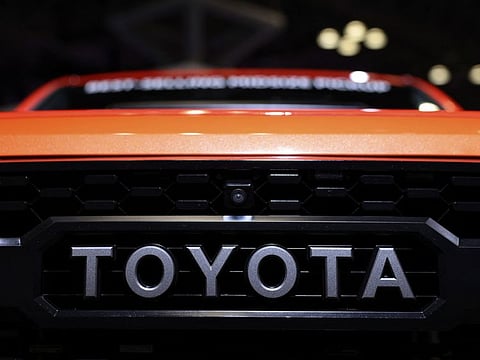Toyota to sell 1.5 million EVs by 2026, roll out 10 new models
Toyota’s plan is to enhance the performance of its bZ series of EVs and in North America

Tokyo: Toyota Motor Corp.’s new CEO Koji Sato unveiled the beginnings of a long-awaited plan to electrify the automaker’s vehicle lineup during his first press conference, but stopped short of outlining concrete steps about how exactly the company will match its EV rivals abroad.
The Japanese automaker, often describing itself as a mobility company whose wish is to change the future of cars, on Friday said it will release 10 new EV models by 2026 and sell 1.5 million battery electric vehicles annually while “strengthening hybrids and plug-in hybrids” in order to honor its pledge to halve emissions by 2035 and become carbon neutral by 2050.
“We must first do what we can and start by electrifying,” Sato said in his first public appearance since becoming CEO and president on April 1. But he didn’t fully embrace a 100 per cent electric future as many other automakers have done, with several slides during Friday’s presentation reinforcing Toyota’s strategy of taking a multi-pathway approach to carbon neutrality.
In developed markets, Toyota’s plan is to enhance the performance of its bZ series of EVs and in North America, have a locally produced battery SUV by 2025 as well as increase battery plant production. In China, it plans to add two locally developed electric models by 2024. In Asia more broadly, Toyota will also focus on battery pick-up trucks and compact electric cars.
Building a dedicated EV production platform from scratch while navigating lingering pandemic measures, supply chain snags and semiconductor shortages is top priority for Toyota as Sato looks to shepherd the Japanese carmaker, which expects to produce as many as 10.6 million cars this year, into a new age of electrification and intelligent vehicles.
“I thought they would talk about Toyota’s values, manufacturing and kaizen in a general way, but it was nice to know the company’s stance on electrification, intelligence and diversification,” Bloomberg Intelligence analyst Tatsuo Yoshida said, referring to the Japanese philosophy of continuous improvement. “They surprisingly talked about things that they might have been planning and thinking, but never really revealed.”
As the world’s biggest car manufacturer with some 370,000 staff globally, and Japan’s largest employer, decarbonizing Toyota is paramount for the island nation’s mission of slashing emissions, phasing out fossil fuels and mitigating climate change. Toyota was at pains to point out during the 90-minute press conference that while it sees carbon as the enemy, it’s important to not leave anyone behind in the shift to a greener future.
The 53-year-old, who previously led Toyota’s luxury brand Lexus and its motorsport division Gazoo Racing, said in February he would take an “EV first” approach, vowing to overhaul battery production and manufacturing platforms by 2026 with Lexus as the plan’s centerpiece. The realigned plan, when it’s announced in its entirety, will likely place Toyota in more direct competition with the two biggest players in the global EV arena: Elon Musk’s Tesla Inc. and China’s BYD Co.
Asked about President Joe Biden’s historic climate bill that encourages electric car production in the US and the sourcing of EV supply chain components outside of China, Executive Vice President Yoichi Miyazaki said Toyota would consider further North American production should demand warrant, without elaborating.
In December 2021, Toyota pledged to sell 3.5 million EVs annually by 2030 however battery EVs accounted for just 16,000 of the 9.5 million cars it sold in the fiscal year ending March 2022. Former CEO Akio Toyoda, who is now Toyota’s chairman, for years defended his stance that the company should continue to offer customers a range of vehicles options, including those powered by hybrid electric or traditional internal combustion engines.
“It’s important that we don’t waver from our multi-pathway strategy,” Executive Vice President Hiroki Nakajima said Friday.
Expectations were high last year when Toyota rolled out its inaugural EV, the bZ4X. That ended in disappointment for customers, however, when thousands of cars were recalled due to concerns that the tires could fall off because the wheels weren’t bolted on tightly enough.
Shares in Toyota dipped slightly in Tokyo trading, down 0.4 per cent.
Sign up for the Daily Briefing
Get the latest news and updates straight to your inbox



